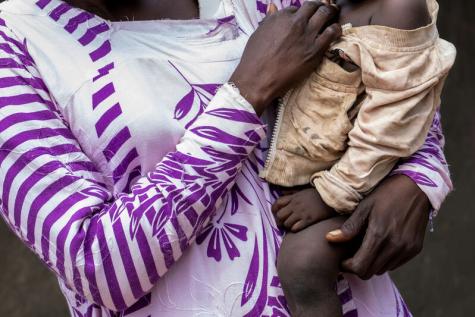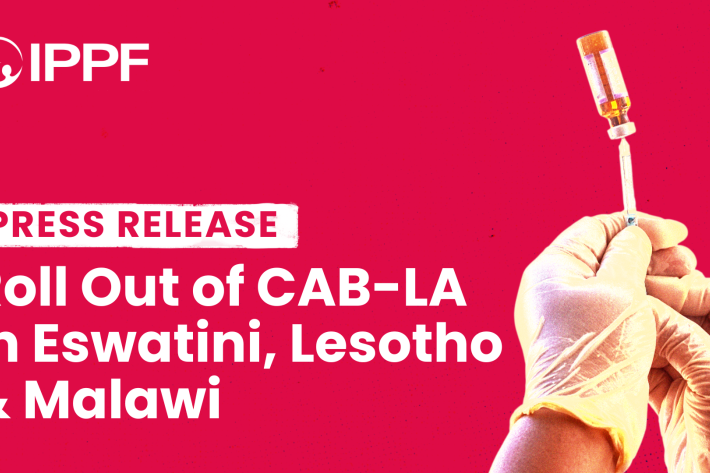Latest press releases
A selection of stories from across the Federation

Tanzania
Almost US$10 mil in US-Funded Contraceptives May Go to Waste in Belgium as Trump Administration Keeps Them In Holding
The Trump administration is holding over $9.7 million of U.S.-funded contraceptives set to be destroyed, with 77 percent of these resources destined for five countries in the African region.
For media enquiries
Telephone:
+44 7918 845944Email IPPF:
Email: media@ippf.org

| 16 October 2025
Almost US$10 mil in US-Funded Contraceptives May Go to Waste in Belgium as Trump Administration Keeps Them In Holding
16 October 2025 - The International Planned Parenthood Federation (IPPF) has been tracking the developing situation in Brussels, where the Trump administration is holding over $9.7 million of U.S.-funded contraceptives set to be destroyed. In August, IPPF shared that 77 percent of these resources were destined for five countries in the African region, with 1,031,400 injectable contraceptives and 365,100 implants earmarked for Tanzania alone. These countries have specific rules for pharmaceutical imports, and as the U.S. government holds these resources, the risk of them becoming ineligible for import becomes imminent and critical. In addition to the cruel and ideological reasons for withholding these contraceptives, the U.S. government is exploiting import regulations to:Skirt around pressure from the Belgian government that would make incinerating these products in Belgium (Flanders) illegal while they are still eligible for import.Enact their initial plan to ensure these life-saving resources do not reach the communities who need them most by withholding them until they become ineligible for importation, and eligible for legal incineration.Use the import thresholds as a loophole to legally incinerate resources before their expiration dates in 2027 to 2029.“Destination countries, including Tanzania (the main recipient), as well as others such as Malawi, Bangladesh, DR Congo, Kenya, apply importation rules that limit entry to medicines with a specific percentage of remaining shelf life. In Tanzania, for example, products with an original shelf life of more than 24 months cannot be imported if less than 60% of the total shelf life remains,” says Marcel Van Valen, Head of Supply Chain at IPPF. “Unless a practical solution is found urgently, the U.S. government may exploit this gap, allowing the products to sit until they technically fall below import thresholds and then justifying their destruction under the pretext of regulatory compliance.”IPPF made continuous efforts to take ownership of these contraceptives and distribute them at no cost to the U.S. government, only to have offers denied. “There is no doubt we could have gone and collected the products in Belgium, processed them in the Netherlands and re-distributed them to where they were needed and/or destined for,” added Van Valen. “Since the start of the negotiations until this day, IPPF is in the position to release a budget (estimated to be max $1.5 million) to support the redistribution.”Instead, the Trump administration has chosen to pursue destroying these resources, a decision that will create catastrophe for women and girls in Africa. By Tanzania’s standards, some products are below threshold already and many others come close to it; the country would have to grant an exemption waiver to allow their importation at this stage.“Even if we were given the opportunity to push for a waiver to receive the contraceptives, because the Tanzanian government is restrictive around reproductive rights, we don’t know that such an exemption would be granted,” says Dr. Bakari Omary, Project Coordinator at Umati, IPPF's Member Association in Tanzania. “It’s urgent that we receive these resources before they become ineligible for import. The contraceptives being held represent 28% of the country’s total annual need, and not having them is already impacting clients’ reproductive health and family planning freedoms.”“African women have long led the fight for reproductive rights and freedoms. The deliberate destruction of contraceptives for the sake of a political agenda is an attempt to strip them of the very freedoms for which they’ve been global advocates,” says Mallah Tabot, SRHR Lead at IPPF Africa. “The Trump administration’s use of import rules to push the blame onto African countries is a waste of millions of dollars, a crisis for human rights, and a betrayal of women’s freedom globally.”Such a critical moment demands collective action. We call on the U.S. government to immediately distribute these resources to their destination countries, and on the European Union and European countries to champion SRHRJ by advocating for the release of the contraceptives. Just as the Belgian government has done in enforcing an incineration ban on these goods, leaders of the European Union have an opportunity to demonstrate their values in action. We call on the E.U. to rally Member States, negotiate with the U.S., and explore all legal and diplomatic avenues to release these contraceptives from their hold and ensure they reach their destination countries.For more information or to interview one of our staff, please contact media@ippf.org or +66628683089.

| 05 August 2025
Over 1.4 Million Women and Girls in Africa Left Without Contraception as U.S. Orders Destruction of Global Supply
6 August 2025 - The International Planned Parenthood Federation (IPPF) has learned that over $9.7 million worth of US-funded contraceptives are now set to be incinerated in France. Seventy-seven percent of these essential supplies were earmarked for five countries in the Africa Region - including the Democratic Republic of the Congo (DRC), Kenya, Tanzania, Zambia, and Mali — many of which are already facing severe humanitarian crises. The incineration of these contraceptives will deny more than 1.4 million women and girls access to life-saving care. Rather than reaching the communities who need them most, these essential medical supplies - many of which don’t expire until 2027 to 2029 - are being needlessly and egregiously destroyed.IPPF Member Associations in the affected countries were due to receive a share of these contraceptive stocks. Instead, they are now facing a sharp decline in supply following the decision to incinerate them. More than 40% of the total value of the contraceptive stockpiled in Brussels was allocated for shipment to Tanzania alone. Dr Bakari Omary, Project Coordinator at UMATI, IPPF’s Member Association in Tanzania, said: “We are facing a major challenge. The impact of the USAID funding cuts has already significantly affected the provision of sexual and reproductive health services in Tanzania - leading to a shortage of contraceptive commodities, especially implants. This shortage has directly impacted clients' choices regarding family planning uptake.”This development adds a new layer of outrage to what is already a cruel political decision. These contraceptives were already manufactured, packaged, and ready for distribution. IPPF offered to take them for redistribution at no cost to the US taxpayer, but this offer was declined. The actions of the U.S. administration make it clear that politics trump economics, given the additional costs necessary for transportation, storage, and incineration of these products. “This decision to destroy ready-to-use commodities is appalling and extremely wasteful. These life-saving medical supplies were destined to countries where access to reproductive care is already limited, and in some cases, part of a broader humanitarian response, such as in the DRC. The choice to incinerate them is unjustifiable and undermines efforts to protect the health and rights of women and girls,” said Marie-Evelyne Petrus-Barry, Africa Regional Director of IPPF.IPPF's local partners in Africa will now face increased challenges to deliver essential and life-saving care. According to RHSC, the loss of these supplies is projected to result in 362,000 unintended pregnancies and 110,000 unsafe abortions: Tanzania: 1,031,400 injectable contraceptives and 365,100 implants will not be distributed. These products represent over 50% of USAID annual support to Tanzania's health system and a terrifying 28% of the total annual need of the country.Mali: 1,100,880 oral contraceptives and 95,800 implants will be denied, 24% of Mali’s annual need.Zambia: 48,400 implants and 295,000 injectable contraceptives will be denied to women.Kenya: 108,000 women will not have access to contraceptive implants, 13.5% of its annual need. Nelly Munyasia, Executive Director for the Reproductive Health Network in Kenya (IPPF Member Association): “In Kenya, the effects of US funding disruptions are already being felt. The funding freeze has caused stockouts of contraceptives, leaving facilities with less than five months' supply instead of the required 15 months; reduced capacity building for health workers; disrupted digital logistics and health information systems, and caused a 46% funding gap in Kenya’s national family planning program. These systemic setbacks come at a time when unmet need for contraception remains high. Nearly 1 in 5 girls aged 15–19 is already pregnant or has given birth. Unsafe abortions remain among the five leading causes of maternal deaths in Kenya.” Sarah Durocher, President of Le Planning familial (IPPF’s French Member Association): “We call on the French government to take responsibility and act urgently to prevent the destruction of USAID-funded contraceptives. It is unacceptable that France, a country that champions feminist diplomacy, has remained silent while others, like Belgium, have stepped in to engage with the US government. In the face of this injustice, solidarity with the people who were counting on these life-saving supplies is not optional: it is a moral imperative.”“We will not stay silent while essential care is destroyed by ideology”, continued Marie-Evelyne Petrus-Barry.Notes: IPPF’s local partners in the countries affected include Reproductive Health Network Kenya, Chama cha Uzazi na Malezi Bora Tanzania, Association Malienne pour la Protection et la Promotion de la Famille, Planned Parenthood Association of Zambia, Association Burkinabé pour le Bien-Etre Familial and the Association pour le Bien-Etre Familial/Naissances Désirables.For more information or to interview one of our staff, please contact media@ippf.org or +66628683089. About the International Planned Parenthood Federation IPPF is a global healthcare provider and a leading advocate of sexual and reproductive health and rights (SRHR) for all. Led by a courageous and determined group of women, IPPF was founded in 1952 at the Third International Planned Parenthood Conference. Today, we are a movement of 158 Member Associations and Collaborative Partners with a presence in over 153 countries. Our work is wide-ranging, and includes services for sexual health and well-being, contraception, abortion care, sexually transmitted infections and reproductive tract infections, HIV, obstetrics and gynecology, fertility support, sexual and gender-based violence, comprehensive sex education, and responding to humanitarian crises. We pride ourselves on being local through our members and global through our network. At the heart of our mission is the provision of – and advocacy in support of – integrated healthcare to anyone who needs it regardless of race, gender, sex, income, and, crucially, no matter how remote.

| 12 March 2025
Japan Funds New $400,000 Project to Support Maternal and Reproductive Health in Afghanistan
12th of March, 2025 – A new project titled “Meeting the Urgent Needs of Marginalised Populations in Crisis-Affected Provinces through Provision of Quality Reproductive and Maternal Child Health Services” has been launched. Funded by the Government of Japan and implemented by the Afghan Family Guidance Association (AFGA), an IPPF Member Association, the project aims to improve access to essential reproductive and maternal health services for vulnerable populations in Afghanistan's crisis-affected provinces. With ongoing challenges from natural disasters, internal displacement, and a fragile healthcare system, comprehensive reproductive and maternal health services in Afghanistan are urgently needed. The project will focus on Logar and Parwan provinces, where communities continue to face significant barriers to accessing vital maternal, newborn, and reproductive healthcare. This initiative will provide high-quality, clinic-based services, including safe delivery care, prenatal and postnatal services, and psychosocial support services (PSS). In addition to clinical care, the project will focus on community outreach and capacity-building programs, empowering individuals with the knowledge and resources needed to make informed decisions about their reproductive health. Key activities and expected outcomes include: Strengthening 21 health centres in Logar and Parwan provinces to provide essential reproductive and maternal care services. This will benefit over 40,000 people, with an estimated 120,000 health services delivered to the local population. Comprehensive reproductive and maternal health services including prenatal and postnatal care for over 2,500 pregnant women, ensuring healthy pregnancies and deliveries. Safe deliveries will take place at Family Health Houses, ensuring the health and safety of mothers and babies. Breast and cervical cancer screening and referrals for over 30,000 women. Psychosocial support through counselling and mental health services. Community outreach and education to raise awareness on reproductive health and rights and family planning. Training local healthcare providers to improve their skills in reproductive healthcare, maternal care, and other essential services - enhancing the overall quality of care provided. H.E. Mr. KUROMIYA Takayoshi, the Ambassador of Japan to Afghanistan, commented, “In Afghanistan, communities affected by crises need urgent access to essential maternal and reproductive health services. This project reflects Japan’s continued dedication to supporting those most severely affected to ensure leaving no one behind.” Dr. Abdul Qayum Azeemi of AFGA, said, “The health of women and children in Afghanistan has always been at the heart of our work. This project will not only provide life-saving maternal and reproductive health services, but it will also help strengthen the healthcare infrastructure in the regions most affected by crises. Together with Japan’s support, we can ensure that those facing the greatest challenges have access to the care they need for a healthier future.” Valerie Dourdin, IPPF Global Humanitarian Director, added, “For years, women and girls in Afghanistan have faced significant barriers to accessing essential health services. Now, more than ever, it is critical that we increase our support. This project will provide life-saving care, offering these communities the health services they so urgently need.” --- About AFGA The Afghan Family Guidance Association (AFGA) is an NGO that advocates for reproductive health and rights and provides quality maternal and reproductive health services across Afghanistan. AFGA is committed to empowering individuals to make informed decisions regarding their health, particularly in underserved and vulnerable communities. About IPPF The International Planned Parenthood Federation (IPPF) is a global healthcare provider and a leading advocate for reproductive health and rights. Established in 1952, in India, IPPF operates in over 146 countries through its network of autonomous member associations.
















